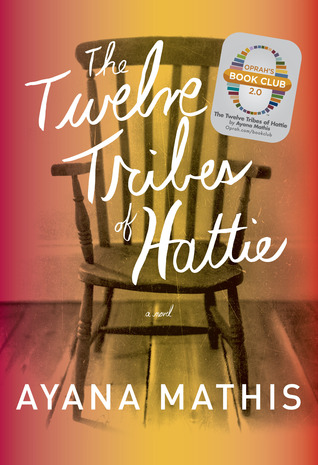The last Oprah Book Club book I read was a recent translation of Anna Karenina, and that was only because I had been meaning to read the book for awhile. Beyond that, I'm persnickety about what I read because I believe writers should be as exciting for their readers as possible, and we can't do that if we're reading what others are reading. I also haven't made up my mind about whether I think reading is fundamentally public or private, though I lean toward the latter.
As a result, I actively ignore bestseller lists. It's easy for me to do since I've collected advanced reader's copies as a book reviewer now for more than 10 years, and my friends all know about my bookish ways, so they give me more. Part of how I chose where I live has to do with the library branch that isn't far from my home.
But every now and then a book comes along that I'm so curious about that I can't wait to read and The Twelve Tribes of Hattie intrigued me from the start.
The Twelve Tribes of Hattie is the first novel I've read since Salvage the Bones. There's been a lot of creative nonfiction and memoir since then - Cheryl Strayed's Tiny Beautiful Things, bell hooks Writing Beyond Race, Ruth Behar's Traveling Heavy and I just started Mary Karr's The Liar's Club. Fiction is a luxury, a way to visit somewhere else without packing up and heading out of town. Tribes is anchored in Philadelphia, though it wanders through the South.
It's been called an allegory of race that draws on Biblical symbols. There are natural comparisons drawn to Toni Morrison because of the depth and reach of the characters in Tribes. The matriarch, Hattie Shepherd, is a tortured soul. She makes peace with her failings, but only after she's had 11 children, a lover, a no-good husband who finds his solace, eventually, in the Lord and her share of heartbreak. Writer Edward P. Jones comes to mind, not just because Mathis shares his skill re: imaginative detail, but because she homes in on what is most interesting about Hattie's children while also finding ways to render their failings beautiful.
Like Jones, Mathis has a strong grasp of history (she acknowledges Isabel Wilkerson's important and necessary book, The Warmth of Other Suns), but she is not overbearing. She makes us feel the lack of humanity in racism before one couple crosses the Mason-Dixon Line and encounters a group of menacing white men who steal the China they use for their picnic at a rest stop. Instead of simplifying the scene into a trite display of bad white men versus a virtuous and victimized black people (think Crash in book form, as much as I loved the book) her skill shows us in the aftermath how fear and loathing as a result of bias can drain and warp a black American's spirit.
There is sexuality and sensuality in the novel, but not as a plot device as much as a characterization of failing in other areas. The beauty of the story is that is a people's narrative, and no one is left out. I'm certain more women will read this than men, but I respected the way she brought to life complicated men who were trying to make ends meet, to be good friends to their women and other mates, how they were trying to repair irreparable damage done to their bodies or their spirits in spite of adversity.
The Twelve Tribes of Hattie is a good read. Its popularity and praise for the book is all well-deserved. I'm excited to read what Mathis publishes next.

I really have to read The Known World! It has been on my radar for years now! I just wanted to let you know that I linked to your review yesterday when I posted my review of The Twelve Tribes of Hattie. I don't know how I missed your blog before, except that there are so many great book blogs out there.
ReplyDelete